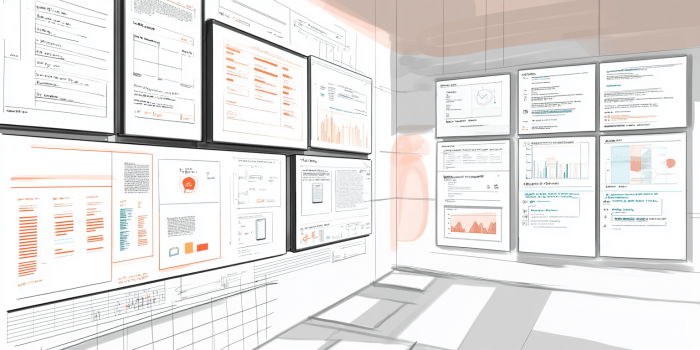- Why large businesses need a custom solution
- Which aspects of structure and functionality should be planned in advance
- SEO, performance, and analytics as the foundation of profitability
- Stages of turnkey online store development
- Comprehensive post-launch support for large-scale online stores
In a large online store, every process is tightly interconnected with others – the catalog structure affects navigation, order logic depends on the service layer, and stable performance directly influences the quality of the customer experience. As the number of products grows and new modules, integrations, and interaction scenarios are added, the limitations inherent in templated solutions become apparent even at the basic level. Lacking the required depth and flexibility, these systems cannot provide precise functional configuration, adapt to business-specific requirements, or ensure full control over the future development of the project. Attempts to tailor such platforms to specific tasks usually only complicate the system further, creating additional constraints instead of resolving existing issues. In such a situation, the optimal choice is a fully customized turnkey solution for a large-scale online store – and in this article, we will take a closer look at its implementation details.

Why large businesses need a custom solution
A properly executed turnkey development of an online store that fully considers the business specifics and the client’s needs offers a range of undeniable advantages:
- The structure is built around real business scenarios, meaning every element – from the catalog to the cart – operates in strict alignment with the business logic rather than the limitations of a pre-built platform. This eliminates conflicts between system components, even when the functionality is expanded.
- The functionality of the project includes only those modules that are actually needed for operational tasks. As a result, the interface remains user-friendly, system load is manageable, and ongoing maintenance doesn’t require constant intervention.
- The management logic is based on the company’s internal processes, allowing employees to work within a familiar environment without having to adjust to rigid templates or alter their established workflows.
- Scalability is built in at the design stage, so business expansion, launching new directions, or adding integrations does not create technical risks or require reworking already implemented components.
- The budget is spent only on features that actually meet the company’s requirements, not on pre-packaged functions, which allows for more efficient resource allocation and precise control over each stage of funding.
- The entire system is designed with actual load capacity, maintenance specifics, and long-term support in mind, ensuring stable post-launch operation without the need for urgent fixes.
Which aspects of structure and functionality should be planned in advance
When planning a large-scale e-commerce project, it is essential to begin with a well-thought-out interaction model between key system elements – even before the technical phase begins – in order to establish clear internal logic. Special attention should be paid to how the category structure is formed within the online store. It must accurately reflect the assortment while integrating seamlessly with filters, product page types, and content rules. This approach allows you to immediately establish a flexible model that supports scaling, ensures intuitive navigation, and delivers a consistent user experience.
At the same time, it is important to define the set of functional modules that will accompany the customer at every stage of interaction – from browsing products to completing a purchase. The personal account, shopping cart, processing system, and tools for payment and delivery must be logically connected and technically compatible with one another. Together, these components significantly reduce the risk of operational conflicts and minimize the need for future modifications, creating a stable and coherent environment for the platform’s daily use.

SEO, performance, and analytics as the foundation of profitability
Beyond just structure and functionality, we also consider the technical aspects that directly influence the success of an e-commerce project after launch. These include:
| Robust SEO foundation. | The platform architecture is designed from the start with search engine requirements in mind, ensuring that the structure, filters, and page URLs are optimized for indexing and don’t create obstacles to promotion. |
| Technical optimization. | All project components are calculated with expected load levels in mind, allowing the system to remain stable even under peak activity without loss of performance. |
| Site speed. | The logic behind loading key components – from search to cart – is built around minimizing delays, as speed directly affects both conversion rates and overall user comfort. |
| Analytics system. | Behavioral data tracking tools are embedded into the architecture itself, enabling not just traffic monitoring but real-time adaptation based on actual user interactions. |
| Search and navigation. | User flow is planned from the earliest design stages, so the journey from initial visit to checkout is intuitive, predictable, and free from unnecessary steps. |
| Platform selection. | In most cases, PHP-based frameworks are the optimal choice, as they offer the adaptability and integration capabilities needed for ongoing expansion without restricting scalability. |
Stages of turnkey online store development
Once all necessary information and client input have been collected, we move directly to development, following a clear and consistent sequence of actions:
- Detail alignment. We conduct a final analysis of the collected data, define the current requirements for the future store, and prepare the technical specification for the next stages.
- Structure and mockup design. We build the logical foundation of the project, where each block serves a specific function, and the design is driven by content and real usage scenarios rather than aesthetic form alone.
- Functionality development. All approved features are implemented by integrating frontend and backend components into a unified system with API, CRM, and other technical modules.
- Internal testing. We evaluate system performance under load, identify unstable areas, fix technical inconsistencies, and prepare the platform for public release.
- Environment configuration. The store is deployed to hosting, backups are configured, protection mechanisms are activated, and key system components are tested across typical use scenarios.
- Project launch. Public access is opened, business scenarios are tested using live traffic, and the result is confirmed against the original agreements set out in the contract.
Comprehensive post-launch support for large-scale online stores
Beyond initial development, we offer our partners ongoing technical maintenance that covers the full range of tasks – from hosting configuration, SSL certificate setup, and regular backups to security monitoring and technical migration. Based on the specifics of the chosen framework, we structure the system with a clear logic, adapt it to the current operational environment, and implement configurations capable of handling any level of workload. This approach guarantees the required scalability and supports the consistent operation of all business processes, delivering predictable results regardless of usage scenarios.
At the same time, we provide full post-launch support, maintaining the functionality of the platform throughout every stage of its growth. We update content, implement new blocks, restructure pages, and adapt logic to evolving business goals – all while preserving system integrity. When load increases, we adjust configurations to support migrations, version updates, and backup scheduling. This kind of support prevents failures and ensures stable performance under all conditions. Every change is coordinated with the client and aligned with the current budget and the terms of the service agreement.

Why you should entrust your custom e-commerce solution to QuatroIT
For anyone looking to launch a large-scale online store, our team is ready to offer the following advantages:
- Comprehensive collaboration. We support our clients throughout every stage of the process – from the first consultation to the project launch – creating a workflow where technical solutions are tailored to actual business needs, not the other way around.
- Result-oriented approach. We care not only about launching the store but also about how it performs over time: how easy it is to track orders, how the system behaves under load, and which components actually drive profit.
- Transparent terms of cooperation. The selected pricing plan is fixed before the project begins, based on the actual scope of work, and every stage is confirmed by a concrete, measurable result that’s clear to both sides.
- Strict adherence to deadlines. We always work within the agreed timeline, understanding how delays can impact sales launches or shift market positioning.
- Smart pricing policy. We help clients allocate their investment wisely, offering solutions that fully cover everything needed for stable store operation and further growth.
- Guarantees and long-term support. After launch, we take care of technical support, updates, data import/export, and we remain actively involved in the project when it enters real-world use.
Planning to launch a large-scale e-commerce business? Or maybe your existing online store is evolving and now needs more than just a basic web platform – it needs a fully managed system with tailored functionality and no templated limitations? Then we’re ready to work with you. The QuatroIT team offers custom project implementation of any complexity, taking into account the specifics of your niche and your individual business needs, while maintaining a comprehensive, results-driven approach. Get in touch – our professional web studio is at your service!











